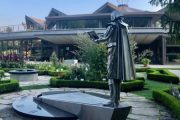Somehow, I survived my year in the back woods of France. Ironically, my survival was helped by two factors, normally not considered beneficial. The first was that I came back to Murat after the Christmas holidays, ill. I had travelled to the UK to see my aunt, my grandmother, and my brother. I had been fine when I had left, but the long journey involving several trains, plus the ferry crossing of the English Channel, followed by even more trains, culminating in the overnight trip from Paris via Clermont-Ferrand to Murat, had finished me off. By the time I reached Paris, I knew that I was ill, but I had to get myself back to Murat somehow. I had no means of reducing my raging temperature, either. I soon ran out of the drinking water I had brought with me, and I knew by then that water on the trains was not potable. Even today, decades later, I recall the horror of my being so unwell during that long, arduous trip. I knew I had to keep going and not miss any of my transfers. I needed to get myself to the school. The last leg of the trip involved walking from the tiny railway station across snow-laden, icy, cobbled streets, to the school itself. It was 7am, on very cold January morning. I didn’t attempt to climb the stairs to my room. Instead, I staggered into the school infirmary, almost collapsing into the arms of the school nurse who put me straight to bed. I don’t remember much of the next many days, except that the village doctor came to visit me, and that both the nurse and the doctor used only rectal thermometers. Yet another experience for me! I didn’t know such things existed till then.
I was far too unwell to work. So that meant I didn’t have to teach for a while, which was wonderful because it gave me a break.
The second factor that helped me to survive arrived in 1968 in the shape of nationwide strikes and riots, causing the closure of all schools, factories, businesses, airports, railways stations, financial institutions, postal services, television, and radio stations. France came to a standstill, as workers and students rioted, especially in Paris and in the larger industrial cities. This upheaval brought the country to a standstill, with everything closed. My school, too, shut down. The boarders went home, the teachers went home. I couldn’t go home, nor could I go to Britain, because I couldn’t leave the village. All railway stations were shut. I had almost no money, and the banks were closed, too. I couldn’t tell my parents what was happening because there was no mail. So, there I was, stranded in this medieval village, with no means of departing.
Were it not for the young math teacher, I don’t know what would have happened to me. No-one else cared about my predicament. Fortunately, my teacher friend had her own car, a small Citroën 2CV, which she had used to drive to Murat in August of the previous year and would use again to get back home at the end of the academic year. Her working-class parents (father, an assembly line worker; mother a homemaker) lived in a tiny house miles away in the Allier region, but they welcomed me as if I were another daughter. I shall be forever grateful for their kindness and hospitality. They were loving and open-minded, not at all like some of the locals with whom Peter Mayle had come into contact in Provence. This wonderful family conveyed not an ounce of hostility nor distrust towards strangers, not to me, nor to their younger daughter’s Moroccan boyfriend, soon to be fiancé and husband, even though in this latter case, their daughter and her fiancé eventually moved to Morocco, where she converted to Islam and is still living happily married to this day.





